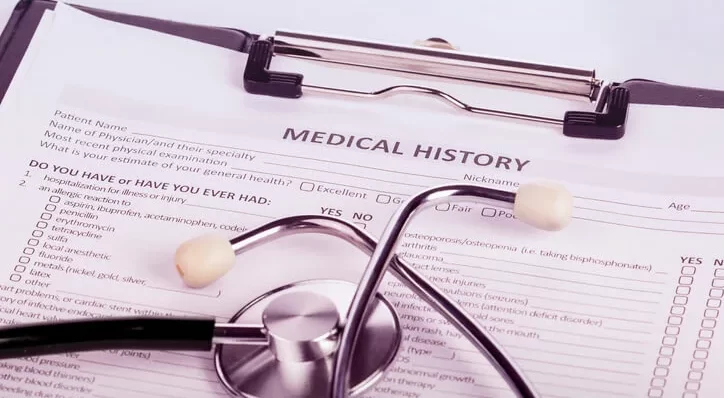In the realm of dentistry, obtaining a thorough medical history from patients is not just a procedural formality; it stands as a cornerstone of comprehensive and safe dental care. The importance of understanding a patient’s medical history cannot be overstated, as it informs dental practitioners about various systemic conditions, medications, allergies, and potential risk factors that might impact dental treatment outcomes. This article aims to elucidate the critical significance of gathering and analyzing medical histories in dental practice, emphasizing its role in patient care, treatment planning, and overall oral health management.
Table of Contents
ToggleUnderstanding Medical History in Dentistry
The process of obtaining a patient’s medical history in a dental setting involves gathering information about their general health, previous and existing medical conditions, medications, allergies, surgeries, family medical history, and lifestyle habits. This comprehensive overview helps dental professionals evaluate potential risks, determine suitable treatment options, and provide tailored care to meet individual patient needs.
Impact on Treatment Planning
A detailed medical history serves as a crucial factor in treatment planning and decision-making. Certain systemic conditions, such as diabetes, cardiovascular diseases, autoimmune disorders, or compromised immune systems, can significantly influence the choice of dental procedures, medications, and anesthesia. For instance, patients with bleeding disorders might require special considerations during invasive dental procedures to minimize bleeding risks.
Communication and Collaboration

Obtaining a detailed medical history fosters effective communication and collaboration among healthcare providers. Sharing relevant information with other healthcare professionals involved in a patient’s care ensures holistic treatment approaches and minimizes potential risks associated with conflicting medications or therapies.
Key Medical Conditions for Medical History in Dental Practice
When gathering a patient’s medical history in a dental practice, it’s crucial to cover a wide range of conditions that could have implications for dental treatment. Here are some key categories and specific conditions that should be included:
- General Health
- Cardiovascular Health
- Respiratory Health
- Endocrine Disorders
- Gastrointestinal Health
- Hematological Disorders
- Renal Health
- Neurological Disorders
- Psychiatric Health
- Allergies and Sensitivities
- Medications and Supplements
- Past Surgeries and Hospitalizations
- Family Medical History
- Lifestyle Factors
General Health
Understanding the patient’s overall health status is essential.
- Chronic conditions: Diabetes, hypertension, asthma, epilepsy, thyroid disorders
- Infectious diseases: HIV/AIDS, hepatitis, tuberculosis
- Immunological disorders: Lupus, rheumatoid arthritis, autoimmune conditions
- Neurological disorders: Parkinson’s disease, multiple sclerosis
Cardiovascular Health
Conditions related to the heart and blood vessels.
- History of heart disease: Coronary artery disease, heart attacks, heart failure
- Hypertension (high blood pressure)
- Arrhythmias: Atrial fibrillation, tachycardia
Respiratory Health
Conditions affecting the lungs and breathing.
- Asthma, chronic obstructive pulmonary disease (COPD)
- Sleep apnea
Endocrine Disorders
Conditions related to hormone regulation.
- Diabetes (Type 1, Type 2)
- Thyroid disorders (hypothyroidism, hyperthyroidism)
Gastrointestinal Health
Conditions related to the digestive system.
- Gastroesophageal reflux disease (GERD)
- History of ulcers or inflammatory bowel disease (IBD)
Hematological Disorders
Blood-related conditions.
- Bleeding disorders: Hemophilia, von Willebrand disease, platelet disorders
- Anemia
Renal Health
Conditions related to the kidneys.
- Chronic kidney disease
- History of kidney stones
Neurological Disorders
Conditions affecting the nervous system.
- Seizure disorders, epilepsy
- Parkinson’s disease
Psychiatric Health
Mental health conditions and treatments.
- Anxiety disorders, depression
- Psychiatric medications
Allergies and Sensitivities
Reactions to medications, substances, or materials.
- Drug allergies (e.g., penicillin, anesthesia)
- Latex allergies
Medications and Supplements
Comprehensive list of current medications, dosages, and supplements.
- Prescription medications
- Over-the-counter drugs.
- Herbal supplements
Past Surgeries and Hospitalizations
History of significant surgeries or hospital stays.
Family Medical History
Noting familial predispositions to certain conditions, especially those with genetic components (e.g., cardiovascular diseases, diabetes).
Lifestyle Factors
Considerations regarding smoking habits, alcohol consumption, and recreational drug use.
Medication Considerations
Understanding a patient’s medication history is vital, as various medications can have oral manifestations or side effects impacting dental treatment. For instance, medications like bisphosphonates used in osteoporosis treatment can lead to osteonecrosis of the jaw (ONJ) in some cases, necessitating cautious dental care planning. Additionally, some medications can cause xerostomia (dry mouth), leading to an increased risk of dental caries and oral infections.
Allergy Assessment
Identifying allergies or adverse reactions to medications or materials used in dental procedures is crucial to prevent allergic reactions or complications during treatment. For instance, latex allergies are relatively common, and using latex-based dental products with sensitive patients can lead to severe allergic reactions.
Systemic Health-Oral Health Connection
The intricate relationship between systemic health and oral health underscores the importance of understanding a patient’s medical history. Numerous systemic conditions, such as diabetes, cardiovascular diseases, and immune disorders, have direct implications for oral health. For instance, uncontrolled diabetes can exacerbate gum disease and impair wound healing following dental surgeries.
Risk Assessment and Precautions
A comprehensive medical history aids in risk assessment and allows dental practitioners to take necessary precautions during dental procedures. Patients with a history of cardiovascular issues may require antibiotic prophylaxis to prevent infective endocarditis during certain dental procedures. Similarly, patients on anticoagulant therapy may need adjustments to minimize bleeding risks during invasive treatments.
Emergency Preparedness
In the event of a medical emergency during dental procedures, knowledge of a patient’s medical history becomes invaluable. Understanding underlying medical conditions, allergies, and medications helps dental teams respond promptly and effectively, ensuring patient safety and well-being.
Challenges and Considerations
Despite its significance, acquiring a comprehensive medical history may pose challenges. Patients might overlook certain medical conditions or medications, leading to incomplete information. Language barriers, patient privacy concerns, or time constraints during appointments can also impede the thorough collection of medical history.
Conclusion
The importance of obtaining and thoroughly reviewing a patient’s medical history in dental practice cannot be overstated. It serves as a critical foundation for providing safe, personalized, and effective dental care. By recognizing the intricate connections between systemic health and oral health, dental practitioners can tailor treatment plans, mitigate risks, and ensure the well-being of their patients. Embracing a patient-centered approach that prioritizes comprehensive medical history assessment is essential for delivering high-quality dental care and promoting overall oral and systemic health.

